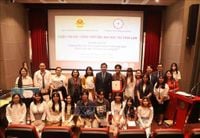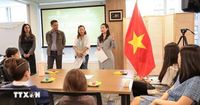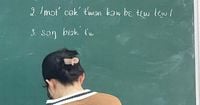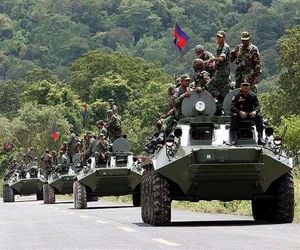In a significant step to promote the Vietnamese language abroad, the Permanent Mission of Vietnam to the United Nations in New York City has partnered with the Vietnamese Language Program at Columbia University to launch a free Vietnamese language class for children from the Vietnamese community in New York and its surroundings. The inaugural class was held on March 22, 2025, and is aimed at children aged between six and fourteen, most of whom were born in the United States and have at least one foreign parent.
Ambassador Dang Hoang Giang, the head of the Permanent Mission, conveyed the importance of maintaining and promoting the Vietnamese language in the United States. He expressed his confidence that this initiative would foster a lively and joyful learning environment for children, encouraging them not only to enhance their Vietnamese language skills but also to gain deeper insights into their cultural traditions and national history. This, he hopes, will strengthen their connections to Vietnam.
Highlighting the collaborative spirit behind this educational initiative, Ambassador Giang acknowledged the dedicated support of Columbia University’s Vietnamese Language Program, specifically thanking close friends of the mission like Professor Nguyen Lien Hang, Director of the East Asia Institute at Weatherhead and lecturer Nguyen Phuong Chung from the Department of East Asian Languages and Cultures. Professor Hang echoed the sentiments of the ambassador, stating it was an honor to partner with the Vietnamese diplomatic mission in efforts to preserve Vietnamese language and culture in the U.S. She expressed her hopes that this program would inspire and motivate the students to learn and embrace their heritage.
The first session saw the young students engaging with spelling and pronunciation exercises led by enthusiastic volunteer instructors from Columbia University. These classes are not only aimed at language acquisition but also seek to instill cultural pride and knowledge among participants.
In addition to these newly launched classes, the Association of Spouses of the Delegation of Vietnam to the United Nations continues to organize regular Vietnamese language and culture classes for the children of Vietnamese officials residing in New York. These initiatives are part of broader efforts responding to the upcoming “Finding Vietnamese Language Ambassadors Abroad in 2025” competition initiated by the State Committee for Overseas Vietnamese and the Ministry of Foreign Affairs, aimed at celebrating and promoting the Vietnamese language in the global context.
Meanwhile, the enthusiasm for learning Vietnamese extends beyond New York. In Thailand, the Vietnamese language is experiencing an upsurge in academic interest. At Srinakharinwirot University in Bangkok, Vietnamese has been part of the curriculum for over ten years, initially as a section of the Eastern Languages Department. It has since evolved into an indispensable component of international programs focused on communication and ASEAN languages and culture.
Dr. Anchalee Chansem, head of the Humanities department at Srinakharinwirot, emphasized that the Vietnamese language serves as a key tool for students seeking job opportunities. She elaborated on the necessity of mutual understanding of languages and cultures within the ASEAN community. “I believe that since we live in the same ASEAN community, understanding each other’s language and culture will strengthen our ties and benefit students’ future careers,” Dr. Chansem stated.
In a classroom at Srinakharinwirot University, over twenty students listened attentively as Ms. Nguyen Thi Chiem taught Vietnamese. Ms. Chiem highlighted the challenges educators face in preparing lessons and engaging students. However, she noted that modern technology, particularly the Internet, significantly aids teachers in crafting lesson plans and interactive games that resonate with today’s youth.
Mr. Parinya Chimbanlang, a Vietnamese teacher at the same university for seven years, shared insights on the advantages of teaching Vietnamese to Thai students, noting that the linguistic similarities between Thai and Vietnamese make it easier for Thai learners. “Vietnamese and Thai share a language family, so pronunciation is not too difficult for Thai students. Additionally, since Vietnamese uses Latin script, it is easier for Thais to learn Vietnamese compared to how difficult it is for Vietnamese to learn Thai,” Mr. Chimbanlang explained.
With increased engagement in learning Vietnamese, students in Thailand are presented with job opportunities, especially given the growing investment and trade activities between Thailand and Vietnam, which many major Thai corporations have established in Vietnam.
Vietnamese language programs are flourishing not only at Srinakharinwirot but also at other prestigious universities in Thailand, including Chulalongkorn University, Mahidol University, Thammasat University, Chiang Mai University, and Udon Thani Rajabhat University. Ms. Do Thuy Ha from Chulalongkorn University mentioned that Vietnamese has been considered a foreign language subject at the faculty for several years, with many former students now serving as diplomats at the Thai embassy in Vietnam.
As a testament to the rising trend of Vietnamese language education, the first Vietnamese Speaking Contest at the university level in Thailand will be hosted by Srinakharinwirot University in November 2024, further promoting the learning of the language among Thai students.
Amid these developments, both in the United States and Thailand, the focus on teaching and learning the Vietnamese language underscores a commitment to fostering cultural connections and understanding. As both communities engage in nurturing the language's use, they pave the way for future generations to retain their linguistic heritage while adapting to a globalized world.







